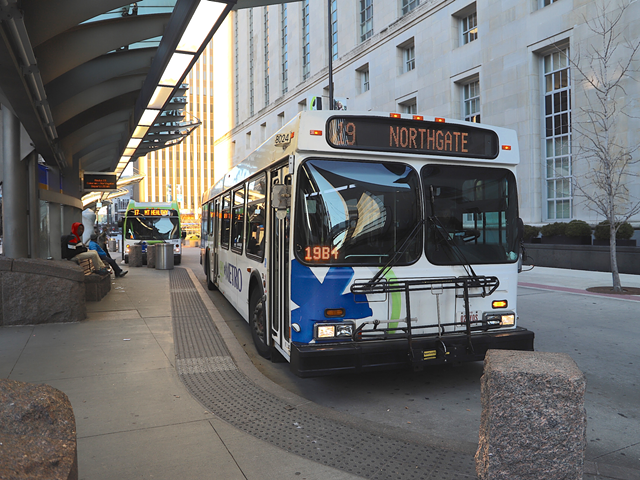They flocked in unexpectedly this morning — little electric scooters that you can rent with a smartphone and a credit card.
Bird Rides, the Los Angeles-based company that launched the scooter pilot program here in Cincinnati today, has already set up outposts in a number of California cities, Austin, Texas and Washington, D.C. Bird also dropped off scooters in Indianapolis last month.
The company and others like them say their electric scooters help solve transportation problems in urban areas.
"Right now, more than one-third of cars trips in the U.S. are less than two miles long, and Birds are perfect for those 'last mile' trips that are too long to walk, but too short to drive," a company spokesperson said in an email today. "Our mission is to get people out of their cars, reduce traffic and congestion, and cut carbon emissions."
But Bird's approach — dropping off the scooters in popular parts of various cities with little or no notice — has ruffled some feathers (err, no pun intended there) and even triggered bans in some of the aforementioned cities.
More on that in a minute. First, though, the immediate question: How well do they work? CityBeat took one out for a spin this morning. They're fun, but there are some uniquely Cincinnati limitations to keep in mind.
The set-up is pretty simple: Download the Bird app and use it to find a scooter in Over-the-Rhine, downtown, and The Banks. The company is cagey about how many it dropped off in Cincinnati, saying only that it will adjust the amount based on ridership. The scooters are dockless, and you can leave them anywhere, so there's no central location to look for. You'll need to take a photo of your driver's license with the app and use your credit card to pay an initial $1 to ride. After you kick-start the scooter with three pushes, you can use a thumb throttle on your right to accelerate. A lever activating disk brakes is at your left hand. Off you go at a cost of 15 cents a minute.
When you pull up the app, there are a number of rules you promise to follow: Bring your own helmet. Ride in bike lanes when possible and watch out for pedestrians. Don't ride down hills.
About those hills: Bird touts its scooters as a solution to the famous "last mile" problem — a stopgap when a bus or walking won't get you to your destination. Here in hilly Cincinnati though, whether the scooter will work for you may depend on what that last mile looks like.
I tried to take the Bird up several moderately-sized hills (the rules don't say you can't go up hills, after all) in northern Over-the-Rhine and Liberty Hill that I would normally walk or bike with relative ease. The scooter made a sad little noise about a quarter of the way up and stopped each time. Others, however, have reported better luck. A second ride on a scooter with about 70 percent battery life yielded slightly better results: the Bird was able to climb about two-thirds of the mellow hill on Milton Street.
The scooters' 15-mile-an-hour top speed makes them best for side roads — you can't get the same head of steam to flow with traffic on a bigger road like you could get on a bike. But zipping down an alleyway or less-trafficked street — or a bike lane, as the app suggests — is much better.
Finally, you'll need to keep your eyes to the ground as you're riding. My trip down 13th Street's crusty lunar landscape was teeth-rattling, and potholes on and near Main Street caused several near-spills.That's not really Bird's fault, but it's something to keep in mind.
All that said, riding the scooter was fairly fun and I could see taking one to a lunch meeting if I didn't have my bike with me.
I may be in the minority on that bike thing, however, if Bird's top guy is right.
"I think bikes are dead now except for racing and exercising," the company's founder and CEO Travis VanderZanden told CNet earlier this year. "Most people when they're commuting from point A to point B, they don't want to sweat and pedal."
VanderZanden isn't new to the disruptive world of startup companies. He founded a car washing startup called Cherry, which rideshare company Lyft acquired in 2013. He then worked for Lyft as its chief operating officer until Uber enticed him away. VanderZanden was hit with a lawsuit by his former company for allegedly smuggling confidential business information over to Uber. The suit was settled in 2016. In September last year, VanderZanden launched Bird and has since steered it to more than $118 million in investment and well over 1 million rides in the cities in which the company operates.
Not everyone loves Bird and similar scooter rental companies Lime and Spin. Officials in Indianapolis actually asked the company to cease operations for 30 days while City Hall worked on regulations for the zippy scooters. Bird declined to do so. In California, some frazzled locals upset about scooters left scattered along local sidewalks and riders zipping along public walkways without any mind to pedestrians have taken to calling the influx of electric scooters from two or three of the companies "Scootergeddon." Local officials have taken heed.
"San Franciscans' safety and public resources are not commodities for these companies to monetize," San Francisco City Attorney Dennis Herrera said shortly after sending the company legal notice to quit operating in April. "San Francisco has had enough of the mantra 'move fast and break things.'"
San Francisco isn't the only place to ban the scooters at least temporarily. Yesterday, Beverly Hills passed its own six-month ban on the scooters. Nashville, Denver, Austin, Miami and Louisville have all enacted at least temporary bans on the scooters.
Other cities have warned the companies not to come at all until a regulatory framework is worked out. Boston Mayor Marty Walsh said that any within the city limits would be sent straight to impound. Bird has set up in several neighboring municipalities, however.
Bird touts its "Save our Sidewalks" pledge as a way to address some of the consternation around the scooters. Under the pledge, the company promises to pick up all its scooters from city streets every night, limit growth unless each scooter already available is used three times a day and remit a dollar a day from every scooter to local governments for bike lanes and other projects. The company also launched a program that waives the initial $1 ride fee for low-income riders who are eligible for state or federal assistance programs.
Will Cincinnati follow the path other cities have taken and regulate or ban the scooters? It's unclear. The city says it had no idea they were coming.
"The City of Cincinnati learned this morning that Bird -- a dockless scooter-share company -- has launched operations in Cincinnati," a statement from the city reads. "Given that we just learned of the matter, we are still in the process of evaluating the possible impact on neighborhoods."






